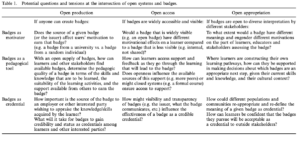Week 9: Cumulative and Synergistic Badges
Knowledge is cumulative and synergistic. And, in my opinion, is one key obstacle to badges gaining societal recognition as recognised credentials. Ahn, Pellicone & Butler (2014) provide a very useful table (see table 1 below) of questions and tensions that arise from their framework that combines three characteristics of badges (motivation, pedagogy and credential) and three components of open (production, access, and appropriation). In this post, I aim to contribute by shedding further light on some of these questions.

Table 1. Potential questions and tensions at the intersections if open systems and badges (Ahn, Pellicone & Butler, 2014).
First, let me explain what I mean by knowledge is cumulative and synergistic. In a university, modules in a degree programme are not silos. For example, linguistics undergraduates may learn “phonology” and “sociology” as separate modules, but they are also (hopefully) taught how to apply what they use to from course to another. Additionally, with the new knowledge that they gain from one course, they can reflect and question what they have learnt from a previous course. Hence, knowledge is cumulative. Lastly, dissertations require students to piece together knowledge from different courses and other skill sets (e.g. critical thinking, understanding of research ethics) to come up with a (at least fairly) original idea. This allows for knowledge and discourses to be advanced. Therefore, knowledge is synergistic.
As a lecturer, I always stress to my students the importance of not just knowing whether someone understands a subject, but also the extent of that understanding. To illustrate this, I will compare a non-honours graduate and a graduate with a 2.1 degree with the same 4.0 (B+ average) GPA. To provide further context, I will use the Bachelor in English Language and Literature programme from the Singapore University of Social Sciences (2020). I was a student and a course chair, for semantics, of this course.
The programme offers 32 compulsory and elective courses. The non-honour graduate only needs to finish 24 courses, whereas the honours graduate needs to complete 30 courses as well as a capstone project. This means that the non-honours student has the luxury to avoid courses that he or she may consider to be more difficult (in terms of content and assessment), more time consuming or less interesting. Typically, these courses are very technical in nature such as syntax, discourse analysis, morphology. Moreover, he or she will have avoided more higher level courses. In contrast, the honours student is compelled to complete almost the entire menu.
Table 2 shows how an honour student who performed better (and by extension, repeatedly demonstrated better understanding) than a non-honours student in 3 modules (A, B, C) can still have the same GPA.
| Student | Module A | Module B | Module C | Module D | Overall GPA |
| Non-honours | 4.0 (B+) | 4.0 (B+) | 4.0 (B+) | (3 x 4.0) = 4.0 | |
| Honours | 4.5 (A-) | 4.5 (A-) | 4.5 (A-) | 2.5 (C) | [(3 x 4.5) + 3.5] / 4 = 4.0 |
Table 2. Comparison of GPAs (grade in bracket) of modules between a non-honours student and an honours student
Though both individuals might have the same GPA, it can be argued that the former’s is inflated (in comparison to the latter). Moreover, the honours student would have had the opportunity to prove that he or she has a strong foundation in the capstone project.. Returning to my previous point, the honours student would have had a more cumulative and synergistic knowledge of English and Literature. In the worst case scenario, the non-honours student will have immense difficulty in understanding the highest level courses simply because he or she will have knowledge gaps. The same logic can be seen in many skill trees (as seen in image 1) in role playing games. Players need to have certain skills in order to unlock higher abilities.

Image 1: ACOdyssey Skill Tree from Assassin’s Creed: Odyssey (Ubisoft, 2018).
Qualifications can also be validations for previous qualifications. Customarily, a reputable Masters’ degree programme, for example the MSc in Social Research Methods from University College London (n.d.), requires candidates to have a 2.1 degree. In some cases, other considerations such as professional experience can be used in lieu of this academic requirement. However, it is rarely the other way round. I have not come across a list of requirements that states that students should have outstanding professional experience but can use a 2.1 degree to replace it. In other cases, a programme might accept a candidate because he or she has multiple qualifications. For example, if a prospective student could be accepted into an MA in Applied Linguistics course despite only have a 2.2 degree because she or she also has a teaching diploma along with significant field exposure.
My main argument against badges is that those that standalone and are without stringent assessment systems are not good signifiers of a person’s abilities. Most of us would not any qualms with hiring someone with a say “Expert in Lights” badge to change our light fixtures. However, it is very unlikely that someone with just a first aid badge will be employed a healthcare worker. Linkedin, an influential and reputable recruitment social media platform, allows users to showcase their badges to potential employers (Wanberg, 2020). Should someone who has attained a badge in “Social Media Marketing” be considered on the same footing as another applicant with a business degree because he or she has a “credential” showing some understanding of the topic? Hence, if badges are to be considered to be credentials, then they must be rightly awarded. They cannot just be indicators of someone knowing something, but how well they know it.
Nevertheless, the idea of badges is promising. People should be encouraged to learn in non-formal contexts such as higher education institutions. Perhaps, governments could create frameworks that award recognised credentials to individuals who have collected the right badges even if they are from different sources. For As an illustration, a government approved “certificate in electrical engineering skills” is awarded to someone who has obtained four relevant badges from different platforms (one from Coursera, two from any university and one from Udemy). This may also lead MOOCs to work closely with other institutions to ensure the quality of their courses. Thus helping individuals gain cumulative and synergistic knowledge, that is in turn recognised.
References:
Ahn, J., Pellicone, A., and Butler, B.S. (2014), Open badges for education: what are the implications at the intersection of open systems and badging? Research in Learning Technology, 22(1)
Singapore University of Social Sciences. (2020). BA in English Language & Literature curriculum plan. SUSS. https://sims1.suss.edu.sg/Eservice/Public/ViewCP/ViewCP.aspx?progcd=BAEL&viewtype=mhtml
University College London (UCL). (n.d.) Social Research Methods MSc. UCL. https://www.ucl.ac.uk/prospective-students/graduate/taught-degrees/social-research-methods-msc#:~:text=The%20programme%20consists%20of%20four,MSc%20in%20Social%20Research%20Methods.
Wanberg, C. (2020, December 9). How do I add my badge to Linkedin? Scrum Alliance. https://support.scrumalliance.org/hc/en-us/articles/360005564651-How-do-I-add-my-badge-to-LinkedIn-




Recent comments